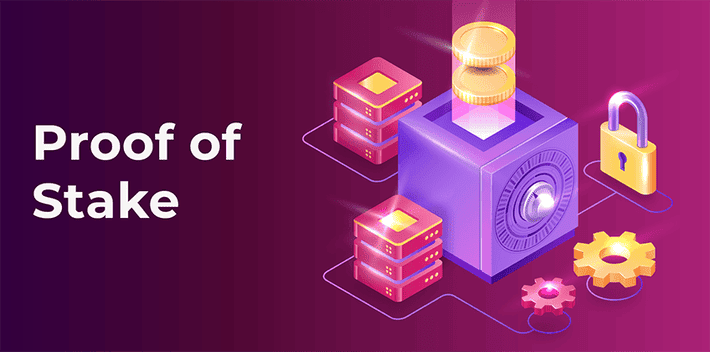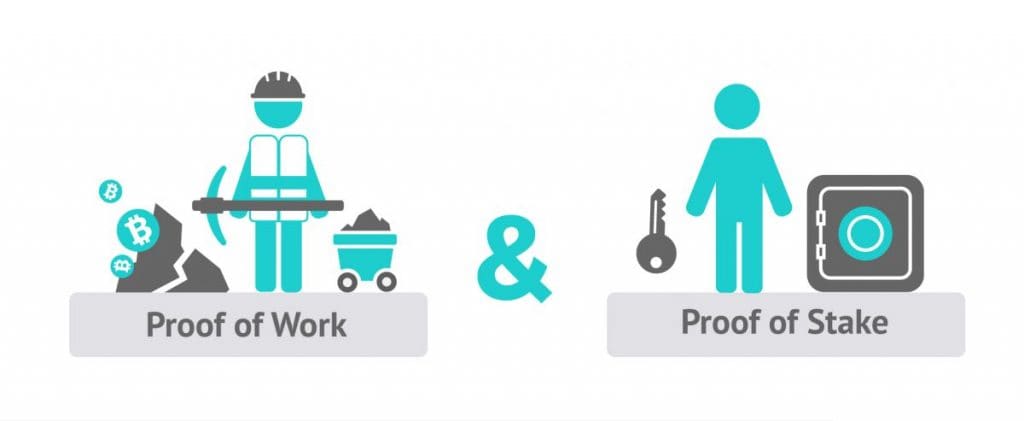Proof-of-Stake


What is Proof-of-Stake?
Proof-of-Stake or in another words – proof of participation, is a consensus algorithm that sets the rules for how transactions are validated on the blockchain. Users can lock up coins or “stake”, and the protocol will randomly assign one of them the right to validate the next block to earn transaction fees. Typically, the probability of being chosen is proportional to the amount of coins you own – the more coins you have, the higher the chances of validating the next block. There are other mechanics typical of a PoS system and various variations of this system. The PoS system is preferred over the Proof-of-Work system due to its reduced energy consumption.
But how is it different from Proof-of-Work? Well, they are two completely different blockchain consensus algorithms. PoS validators are selected to build blocks based on the quantity of bitcoin they “stake” as collateral, whereas PoW validators need substantial computing power and energy to solve intricate mathematical puzzles in order to validate transactions. Also, when PoW is known for its high energy consumption, PoS is more secure against specific types of cyber attacks and it uses less energy as well.

Understanding of Proof-of-Stake
All the blockchains are built on a consensus mechanism that establishes a node’s agreement on the legitimacy of data. Validators are usually chosen through the Proof of Stake algorithm depending on who is staking native tokens. Validator needs an active internet connection and deposit tokens into a wallet that supports staking. A number of factors, including the quantity and length of tokens staked, as well as a random function, can be used to choose validators. Some blockchains create distinct types of proof of stake, such as Delegated PoS or Pure PoS, by imposing a minimum quantity of bitcoin to be staked.
When used properly, Proof-of-Stake can be considered as a safe and secure consensus mechanism. It provides a number of security features, such as resistance to Sybil attacks, more than 50% of cyber attacks or other weak spots that are common for the blockchain. Nevertheless, a number of variables affect a PoS system’s security and safety, therefore it’s important to take these into account when assessing a PoS blockchain’s security.
Latest Tweets about Proof-of-Stake
Latest news about Proof-of-Stake
- Vitalik Buterin’s “Proof of Stake” is set to release on September 27 in both digital and physical formats. The book, which includes technical concepts and context from media studies scholar Nathan Schneider, will be available in both digital and physical formats. Fans can pre-order the book for approximately $19 and can mint non-transferrable signed NFTs by donating ETH via GitCoin. Proceeds from signed digital copies will be donated to public goods, with 90% going to the Bitcoin Grants matching pool and 10% to Seven Stories Press.
- Ethereum’s oldest test network, Ropsten, has successfully transitioned from proof of work to proof of stake (PoS), marking a significant step towards optimizing energy, efficiency, and reducing environmental impact. The merger, which only affected the consensus layer, is expected to reduce Ethereum’s energy consumption rate by 99.9%. The transition is expected to be completed in late August, with transaction times and gas fees remaining unchanged. Co-founder Vitalik Buterin expressed excitement about the progress and plans to conduct two more testnet merges on Goelri and Sepolia before a full-fledged mainnet merge. The results of the Ropsten merge suggest Ethereum’s potential long-term viability and sustainability, potentially giving it an edge over competitors like Solana.
Disclaimer
In line with the Trust Project guidelines, please note that the information provided on this page is not intended to be and should not be interpreted as legal, tax, investment, financial, or any other form of advice. It is important to only invest what you can afford to lose and to seek independent financial advice if you have any doubts. For further information, we suggest referring to the terms and conditions as well as the help and support pages provided by the issuer or advertiser. MetaversePost is committed to accurate, unbiased reporting, but market conditions are subject to change without notice.
About The Author
Viktoriia is a marketing researcher and copywriter with a background in international relations. Her professional portfolio includes the writing of research papers focused on the import and export of products to Europe and Asia. Proficiency in the Chinese language and the time she has spent in China have extended her capabilities to master not only European markets but also those in China and Singapore. While currently living in Italy, Viktoriia continues to deepen her knowledge and skills in marketing and copywriting. Her experience allows her to perform analytical work and create texts on a diverse range of topics, ensuring accessibility to a broad audience.
More articles

Viktoriia is a marketing researcher and copywriter with a background in international relations. Her professional portfolio includes the writing of research papers focused on the import and export of products to Europe and Asia. Proficiency in the Chinese language and the time she has spent in China have extended her capabilities to master not only European markets but also those in China and Singapore. While currently living in Italy, Viktoriia continues to deepen her knowledge and skills in marketing and copywriting. Her experience allows her to perform analytical work and create texts on a diverse range of topics, ensuring accessibility to a broad audience.






















































